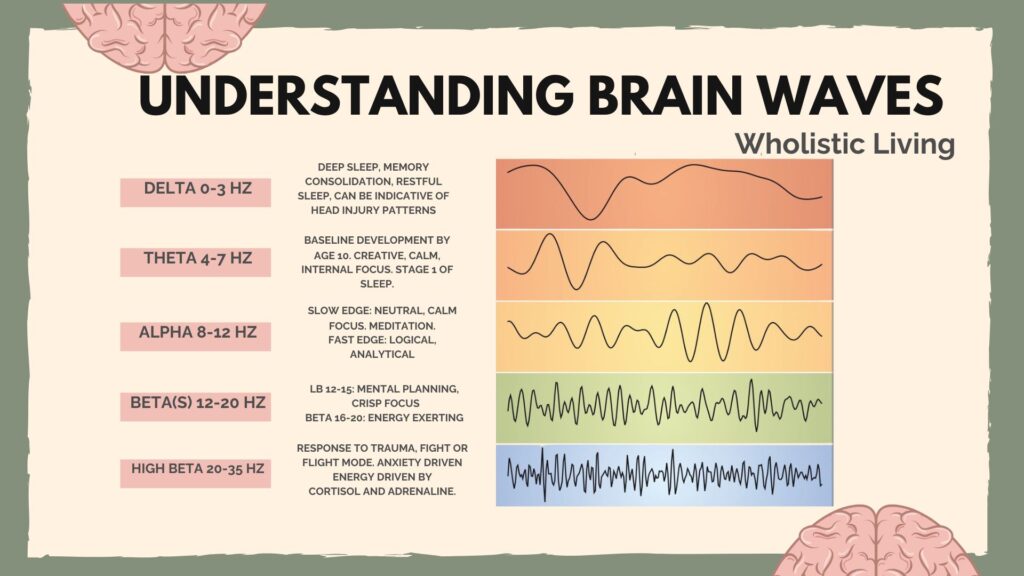What is Neurofeedback Therapy? Unlocking the Benefits for ADHD, Insomnia, and Anxiety
Filed in Mental Health — February 10, 2025

Are you struggling with ADHD, insomnia, anxiety, or depression? You’re not alone. Millions of people around the world face these challenges every day. Traditional treatments like medications and therapy can work, but they often come with side effects and aren’t always effective for everyone. What if there was an alternative, a way to retrain your brain to work more efficiently and effectively, without relying on pills or invasive treatments? That’s where Neurofeedback Therapy comes in.
In this blog post, we’re going to dive deep into the question what is Neurofeedback therapy, how it works, and the incredible benefits it offers—especially for those dealing with conditions like ADHD, insomnia, anxiety, and depression. Plus, I’ll introduce you to an innovative way to access Neurofeedback therapy from the comfort of your own home using the Myndlift app. It’s time to take control of your brain health, and I’ll show you how.
What is Neurofeedback Therapy?
Neurofeedback therapy is a type of biofeedback that trains your brain to function more efficiently. It’s a non-invasive, drug-free therapy that involves monitoring brainwaves and providing real-time feedback to help you regulate them. The goal is to help you achieve optimal brainwave patterns for better cognitive function and emotional regulation.
Brainwaves are electrical impulses in your brain that correspond to different mental states. These include:
- Delta waves (deep sleep)
- Theta waves (light sleep and relaxation)
- Alpha waves (calm and focused)
- Beta waves (alertness and concentration)
- Gamma waves (high-level cognitive processing)
Each of these brainwave states serves a different purpose, and an imbalance can contribute to various issues, including the conditions we’re focusing on here: ADHD, insomnia, anxiety, and depression. Neurofeedback therapy works by training your brain to shift between these states more efficiently, leading to better mental health and well-being.

Neurofeedback Therapy for ADHD
What is ADHD?
Attention Deficit Hyperactivity Disorder (ADHD) is a condition that affects millions of children and adults. People with ADHD often struggle with attention, hyperactivity, and impulse control. These challenges can interfere with school, work, and relationships.
How Neurofeedback Helps ADHD
Neurofeedback has shown significant promise in treating ADHD by training individuals to enhance the regulation of brainwave activity associated with focus and attention. People with ADHD tend to have an excess of theta waves (related to daydreaming or relaxation) and a deficiency in beta waves (linked to concentration and alertness).
By using Neurofeedback therapy, individuals with ADHD can learn to increase their beta waves while reducing theta waves, leading to better focus, attention, and impulse control. Studies have shown that consistent Neurofeedback training can improve attention span, reduce hyperactivity, and even reduce the need for medication in some cases.
Evidence of Neurofeedback’s Effectiveness for ADHD
Research studies have demonstrated that Neurofeedback therapy can be an effective treatment for ADHD. One study published in the Journal of Attention Disorders found that children who underwent Neurofeedback therapy showed significant improvements in attention, impulsivity, and hyperactivity. The improvements were long-lasting, with many participants continuing to experience positive effects months after treatment ended.
Myndlift’s Remote Neurofeedback Program for ADHD
Myndlift’s remote Neurofeedback program allows you to train at home, making it convenient and accessible. With the Myndlift app, you can work with a certified Neurofeedback trainer and receive personalized feedback based on your brainwave patterns. This innovative program can be especially helpful for those with ADHD, as it allows you to train your brain in the comfort of your own space all while you watch your favorite show or listen to music.
Neurofeedback Therapy for Insomnia
What is Insomnia?
Insomnia is a sleep disorder that makes it difficult to fall asleep or stay asleep. It affects millions of people worldwide and can have a profound impact on your overall health. Lack of sleep can lead to irritability, difficulty concentrating, and even more serious health problems.
How Neurofeedback Helps Insomnia
Neurofeedback can help with insomnia by promoting the brainwave patterns associated with relaxation and deep sleep. People with insomnia often have difficulty entering the delta wave state, which is essential for restorative sleep. Neurofeedback training helps individuals strengthen their brain’s ability to produce these waves, leading to improved sleep quality.
Evidence of Neurofeedback’s Effectiveness for Insomnia
Research supports the use of Neurofeedback therapy for treating insomnia. One study published in the Journal of Clinical Psychology found that participants who underwent Neurofeedback training experienced significant improvements in sleep quality and duration. They also reported feeling more rested and less fatigued during the day.
Myndlift’s Remote Neurofeedback Program for Insomnia
With Myndlift’s app, you can train your brain to enter the proper sleep state more easily. Through Neurofeedback, you’ll learn how to increase your delta waves, helping you fall asleep faster and enjoy deeper, more restful sleep. With the app’s easy-to-use interface, you can track your progress and get real-time feedback to ensure you’re training your brain effectively.
Neurofeedback Therapy for Anxiety
What is Anxiety?
Anxiety is a mental health disorder that causes excessive worry, fear, and nervousness. It can interfere with daily activities and lead to physical symptoms like a racing heart, sweating, and difficulty breathing. People with anxiety often have trouble calming their mind and may experience an imbalance in their brainwave patterns.
How Neurofeedback Helps Anxiety
Neurofeedback can help individuals with anxiety by training the brain to shift from a hyper-alert, anxious state (characterized by excessive beta waves) to a more relaxed and balanced state (with increased alpha waves). This leads to a reduction in anxiety symptoms and a greater sense of calm and well-being.
Evidence of Neurofeedback’s Effectiveness for Anxiety
Numerous studies support the use of Neurofeedback for anxiety. A meta-analysis published in the Journal of Anxiety Disorders found that Neurofeedback was effective in reducing anxiety symptoms, with participants experiencing lasting improvements. In another study, patients with generalized anxiety disorder showed significant reductions in anxiety after completing Neurofeedback training.
Myndlift’s Remote Neurofeedback Program for Anxiety
If you’re struggling with anxiety, Myndlift’s remote Neurofeedback program can provide a solution that fits into your lifestyle. The Myndlift app helps you train your brain to reduce anxiety, promoting relaxation and mental clarity. As you progress through the training, you’ll notice a gradual reduction in anxiety symptoms and an overall improvement in your mood.
Neurofeedback Therapy for Depression
What is Depression?
Depression is a mood disorder characterized by persistent feelings of sadness, hopelessness, and a lack of interest in daily activities. It can affect your ability to work, interact with others, and take care of yourself. Like anxiety, depression is often linked to imbalances in brainwave activity.
How Neurofeedback Helps Depression
Neurofeedback helps people with depression by promoting brainwave patterns associated with positive mood and emotional regulation. People with depression often show an excess of theta waves (associated with fatigue and negative emotions) and a deficiency in alpha waves (which promote relaxation and positive feelings). Neurofeedback therapy helps shift the brain toward a healthier balance of these waves.
Evidence of Neurofeedback’s Effectiveness for Depression
Several studies have shown that Neurofeedback therapy can be effective in treating depression. A study published in Biological Psychology found that Neurofeedback led to significant improvements in mood and energy levels in patients with major depressive disorder. Participants reported feeling more positive, engaged, and hopeful after completing Neurofeedback training.
Myndlift’s Remote Neurofeedback Program for Depression
With Myndlift’s remote Neurofeedback program, you can train your brain to regulate your emotions and improve your mood. Using the Myndlift app, you can access customized Neurofeedback sessions that help balance your brainwaves, promoting a more positive, balanced state of mind. This can lead to lasting improvements in your mental health and well-being.
Pros and Cons of Neurofeedback Therapy
Pros of Neurofeedback Therapy
- Non-Invasive and Drug-Free: Neurofeedback therapy offers a natural alternative to medication. It doesn’t require drugs or invasive procedures.
- Long-Lasting Results: Many individuals experience lasting improvements in their symptoms, often months after completing their Neurofeedback training.
- Personalized Training: Myndlift offers tailored training programs, allowing you to receive feedback specific to your brainwave patterns and goals.
- Convenient and Accessible: With Myndlift’s app, you can train from the comfort of your own home, making it easier to fit Neurofeedback therapy into your schedule.
- Improves Overall Brain Health: In addition to helping with specific issues like ADHD, insomnia, anxiety, and depression, Neurofeedback can also improve your overall cognitive function and mental clarity.
Cons of Neurofeedback Therapy
- Requires Consistency: For best results, Neurofeedback therapy requires regular sessions over a period of time. It’s a commitment, but the results can be life-changing.
- Upfront Investment: While it’s a long-term solution, Neurofeedback therapy is an investment in terms of both time and money.
- May Not Work for Everyone: Like any therapy, Neurofeedback may not be effective for every individual or every condition.
You can learn more about remote Neurofeedback therapy as well as how you can get started today on my website, www.shelbyjohn.com. You can also schedule a FREE 15 minute consult call if you would like.
Take Control of Your Mental Health with Myndlift
If you’re ready to explore the benefits of Neurofeedback therapy, I invite you to try Myndlift’s remote Neurofeedback program. Whether you’re dealing with ADHD, insomnia, anxiety, or depression, this therapy could be the key to unlocking better mental health. It’s time to take control of your brain health and see the incredible benefits for yourself.
Download our free guide today Is Neurofeedback Therapy Right For You. Don’t let mental health struggles hold you back any longer—start your journey to a healthier mind with Myndlift.
Disclaimer: Always consult with a healthcare provider before starting any new therapy or treatment plan.


